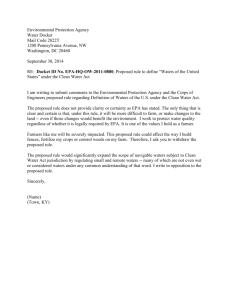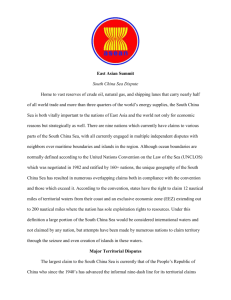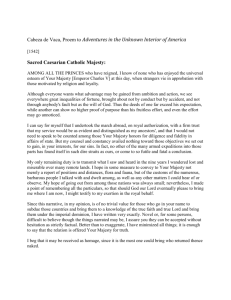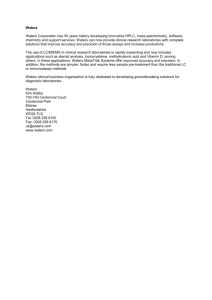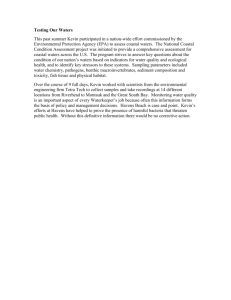(c) crown copyright Catalogue Reference:CAB/129/53 Image Reference:0047
advertisement
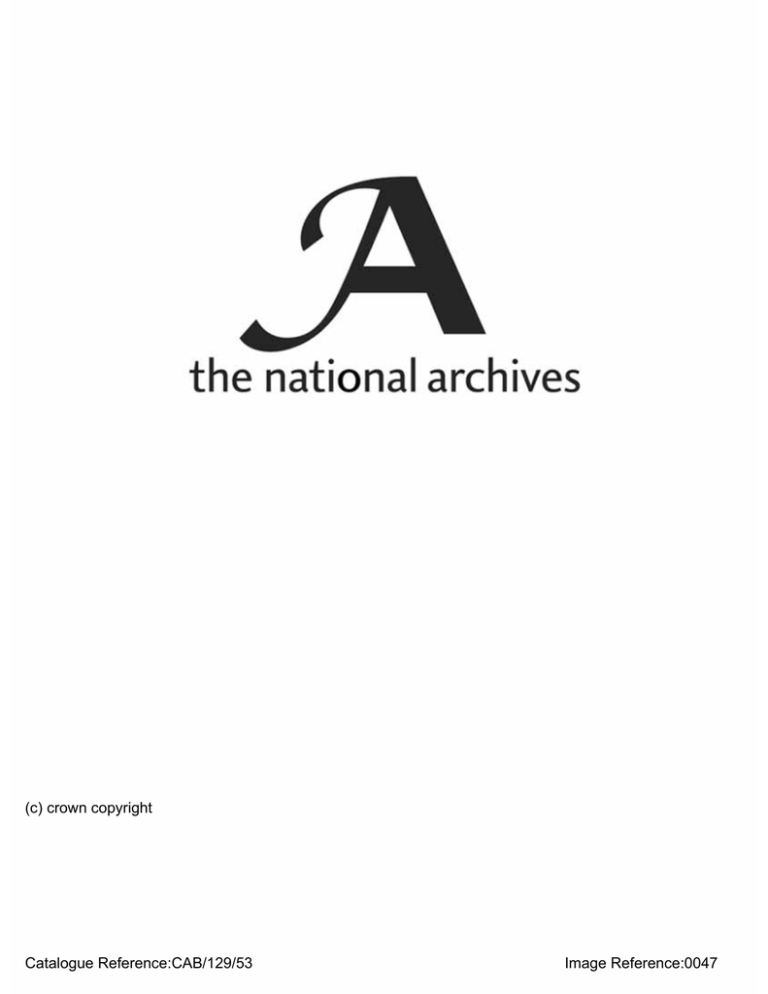
(c) crown copyright Catalogue Reference:CAB/129/53 Image Reference:0047 Printed for the Cabinet. CONFIDENTIAL C. (52) 247 21st July, CABINET RECORD July 1952 OFFiCfc Copy N o . ? 2 COPY 1952 CABINET D E L I M I T A T I O N OF T E R R I T O R I A L W A T E R S : A P P L I C A T I O N B Y H E R M A J E S T Y S G O V E R N M E N T O F T H E PRINCIPLES L A I D D O W N B Y T H E I N T E R N A T I O N A L C O U R T O F JUSTICE MEMORANDUM BY THE SECRETARY OF STATE FOR FOREIGN AFFAIRS The Hague Court Judgment.—On 18th December, 1951, the International C o u r t of Justice at T h e H a g u e delivered a judgment in the Anglo-Norwegian Fisheries case in favour of N o r w a y . This j u d g m e n t was concerned with the m a n n e r in which territorial waters could be delimited (though not with their actual breadth), and, in delivering it, the C o u r t laid d o w n certain general principles of international law governing the matter. 2. These new principles differ radically from those which Her Majesty's G o v e r n m e n t have hitherto conceived to be the law. They entitle a country to r e c k o n its territorial waters from a " base-line " joining outer headlands, islands and rocks, provided that the resulting line is " reasonable " and follows the general direction of the coast. H e r Majesty's G o v e r n m e n t have in the past held that the belt of territorial waters should be measured from the low-water m a r k along the coast and across the entrances to bays at a point where they are n o t m o r e than 10 miles wide. 3. Implications for the United Kingdom.—The question arises whether H e r Majesty's G o v e r n m e n t should in future claim r o u n d the United K i n g d o m a n d r o u n d the Colonies, Protectorates and other territories overseas for which H e r Majesty's G o v e r n m e n t are responsible, territorial waters measured according to the m o r e liberal principles enunciated by T h e H a g u e Court. T h e effect would be to increase considerably the area of waters over which H e r Majesty's G o v e r n m e n t could claim jurisdiction, including exclusive fishery rights. This question has been considered by the H o m e Affairs Committee, who have, however, decided that, in view of the importance of the issues at stake, it should be submitted to the Cabinet. 4. Divergent Views of Government Departments.—In spite of prolonged discussion at the official a n d Ministerial level, it has not been possible to reach a n agreed recommendation. Considerable pressure is being brought to bear by fisheries interests in Scotland to have T h e H a g u e C o u r t principles applied r o u n d the Scottish coast in order to close larger areas to foreign trawlers. T h e Scottish H o m e D e p a r t m e n t are wholly in favour of extending our territorial limits in this way as early as possible in the interests of the Scottish inshore fishing industry. The White Fish Authority, whose responsibilities cover all sections of the British white fish industry, have r e c o m m e n d e d to the G o v e r n m e n t that action on these lines should be taken. 5. O n the other h a n d , the immediate a d o p t i o n Of T h e H a g u e C o u r t principles is opposed by the A d m i r a l t y and the Ministry of T r a n s p o r t on the ground that it is not yet clear that they are going to be generally adopted by other countries including particularly the U n i t e d States, or that they will be approved by the International Law Commission of the U n i t e d N a t i o n s . They believe that as a naval a n d maritime Power we should hold to our established policy of maintaining 42605 a m a x i m u m area of the seas free from national jurisdiction and should d o n o t h i n g ! which would encourage other countries to apply T h e H a g u e Court principles in a m a n n e r detrimental to our interests. 6. The International Position.—The fact is, however, that some other countries, including N o r w a y , Sweden, Saudi Arabia, Ecuador, Yugoslavia, Egypt and F r a n c e (the last-named to a limited extent), h a d already adopted the new principles to a greater or lesser extent even before the announcement of T h e H a g u e C o u r t ' s judgment. Iceland, which h a d adopted t h e m on her northern coast before the announcement, has subsequently applied them to the remainder of her coast line. There is considerable pressure from fishing interests in G r e e n l a n d and the F a r o e s for the adoption of the principles by the Danish Government. All this is p a r t of a general tendency in favour of the extension of territorial limits which has only been strengthened by^The H a g u e Court's judgment. Even in the C o m m o n ­ wealth there is n o chance of solid opposition t o the new principles. T h e position n o w is that H e r Majesty's G o v e r n m e n t cannot seriously challenge base-lines a d o p t e d by other countries as long as they apply The H a g u e C o u r t principles in a reasonable fashion. T h e interests of H e r Majesty's G o v e r n m e n t would there­ fore a p p e a r to be best served b y exercising a m o d e r a t i n g influence without, at the same time, adopting a n attitude so hostile to the new principles t h a t it would have little or no support outside the U n i t e d K i n g d o m . Moreover b y accepting base-lines we are more likely to obtain support from other countries for our efforts to maintain the principle that the actual belt of territorial waters should be limited to 3 miles (except where there is a valid prescriptive claim to a wider limit); a principle to which all D e p a r t m e n t s attach importance. 7. T h e International L a w Commission, which is a b o d y of jurists established by the U n i t e d N a t i o n s t o m a k e recommendations to the General Assembly for the codification of international law, is intending t o study the questions of the delimitation and b r e a d t h of territorial waters, and will probably be issuing a report in 1953. T h e r a p p o r t e u r of the Commission has recently produced a first report to provide the basis of the C o m m i s s i o n ^ discussion. I n this he recommends the general acceptance of T h e H a g u e C o u r t base-line principles for indented coasts, t h o u g h with some safeguards (such as the limitation of the length of base-lines t o 10 miles in some cases). A l t h o u g h it is impossible to prophesy what the Commission itself will r e c o m m e n d , it seems most i m p r o b a b l e that there will b e any general return to the stricter methods of delimitation still applied by the U n i t e d K i n g d o m or t h a t any great degree of international support for such an attitude could be obtained. 8. In the circumstances there would appear to be n o advantage t o be gained from postponing a decision to apply T h e H a g u e C o u r t principles to the U n i t e d Kingdom. 9. Action Required to Apply The Hague Court Principles.—If it is decided to a d o p t T h e H a g u e C o u r t principles, it will be necessary— id) to introduce legislation providing ifor the definition of the n e w limits of t h e territorial waters of the U n i t e d K i n g d o m , Colonies, Protectorates, &c; (b) to consider w h e t h e r certain international treaties, namely the Anglo-French Fishery Convention of 1839 and the N o r t h Sea Fisheries Convention of 1882, which lay d o w n limits b a s e d on the previous conception of the law, should b e abrogated or amended by agreement. This action will b e necessary to secure t h e full benefits of the new principles for our inshore fishermen. 10. Recommendation.—For the reasons given above, my r e c o m m e n d a t i o n is that a decision in principle should n o w b e taken t o accept the use of the base-line m e t h o d for the delimitation of territorial waters r o u n d t h e United K i n g d o m and that the interdepartmental official committee on territorial waters should be instructed to p r e p a r e specific r e c o m m e n d a t i o n s on the following points.: — (d) the timing of any public statement o n the subject and the date when the decision should be p u t into effect, bearing i n mind the desirability of prior consultation with the C o m m o n w e a l t h a n d with the U n i t e d States a n d other G o v e r n m e n t s ; (b) the detailed definition of the exact waters to be claimed around the U n i t e d K i n g d o m on the basis of a reasonable a n d m o d e r a t e application of the principles laid d o w n by T h e H a g u e C o u r t ; (c) the action to be taken in regard to the Anglo-French Fishery Convention of 1839 a n d the N o r t h Sea Fisheries Convention of 1882; (d) the action to be taken in respect of territorial waters r o u n d the Colonies, Protectorates a n d other territories overseas for which Her Majesty's G o v e r n m e n t are responsible; (e) the desirability of holding a conference of fishing Powers to discuss exclusive fishery limits (a suggestion which has been m a d e in the H o u s e of C o m m o n s and in the Press); (/) any other points which require consideration before steps can be taken to introduce the necessary legislation in the H o u s e of C o m m o n s . A . E. Foreign Office, S.W.1, 21st July, 1952.
